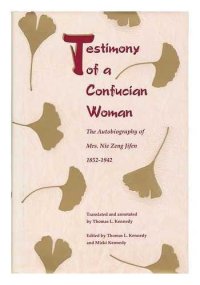
Ebook: Testimony of a Confucian Woman: The Autobiography of Mrs. Nie Zeng Jifen, 1852-1942
- Year: 1993
- Publisher: Univ of Georgia Pr
- Edition: 1
- Language: English
- pdf
Testimony of a Confucian Woman is the compelling autobiography of a woman who lived through the most dramatic changes in modern Chinese history: the fall of the Qing dynasty, the establishment of the Republic of China, and the rise of the Guomindang and the Chinese Communist party. Nie Zeng Jifen's autobiography provides an account of the changes in elite family life in China during the transition from a bureaucratic to a bourgeois society, unveiling the personal beliefs and values of a Confucian woman.
Born in Beijing in the year the Taiping Revolutionary Movement swept across south China, Zeng Jifen was the daughter of Zeng Guofan, the victorious leader of the struggle against the Taipings, founder of China's first steam-powered machine industry, governor general of three of China's richest provinces, and paragon of traditional Confucian virtues. Her husband, Nie Qigui, directed the huge government-owned industrial complex founded by his father-in-law and was later a prominent official in east China. As the empire was crumbling, he launched his two sons in the textile industry in Shanghai. Widowed in 1911, Mrs. Nie assumed the role of matriarch of one of the prominent bourgeois families of twentieth-century China.
The mother of twelve children, Mrs. Nie lived her ninety years in the confines of a traditional elite family, yet she found ways to extend her influence and to shape the fortunes and careers of family members at high levels of government and society. Her account of her life provides a view of traditional Chinese society under the stress of modernization and of a proud family steeped in tradition but disposed by the pressure of the times to adapt essential features of its intellectual and material heritage. It suggests important continuities between nineteenth- and twentieth-century China.
Testimony of a Confucian Woman touches upon many salient features of China's history during Mrs. Nie's lifetime: regional differences, religious beliefs, education, banking and business practices, official corruption, the importance of ritual, and a range of matters relating to domestic life - gender roles, marriage customs, child-rearing, concubinage, food, clothing and hairstyles, and medical practices.
Thomas and Micki Kennedy have sought to make Mrs. Nie's autobiography readily accessible to contemporary Western readers while preserving the terse gentility of her literary style. An introductory essay that gives cultural and historical background, voluminous annotations based on Chinese, Japanese, and Western language materials, and an interpretative afterword enable readers unfamiliar with China's recent past to meet Mrs. Nie in her own world and to make sense of the movements for social change that shaped China's nineteenth- and twentieth-century elite.
Born in Beijing in the year the Taiping Revolutionary Movement swept across south China, Zeng Jifen was the daughter of Zeng Guofan, the victorious leader of the struggle against the Taipings, founder of China's first steam-powered machine industry, governor general of three of China's richest provinces, and paragon of traditional Confucian virtues. Her husband, Nie Qigui, directed the huge government-owned industrial complex founded by his father-in-law and was later a prominent official in east China. As the empire was crumbling, he launched his two sons in the textile industry in Shanghai. Widowed in 1911, Mrs. Nie assumed the role of matriarch of one of the prominent bourgeois families of twentieth-century China.
The mother of twelve children, Mrs. Nie lived her ninety years in the confines of a traditional elite family, yet she found ways to extend her influence and to shape the fortunes and careers of family members at high levels of government and society. Her account of her life provides a view of traditional Chinese society under the stress of modernization and of a proud family steeped in tradition but disposed by the pressure of the times to adapt essential features of its intellectual and material heritage. It suggests important continuities between nineteenth- and twentieth-century China.
Testimony of a Confucian Woman touches upon many salient features of China's history during Mrs. Nie's lifetime: regional differences, religious beliefs, education, banking and business practices, official corruption, the importance of ritual, and a range of matters relating to domestic life - gender roles, marriage customs, child-rearing, concubinage, food, clothing and hairstyles, and medical practices.
Thomas and Micki Kennedy have sought to make Mrs. Nie's autobiography readily accessible to contemporary Western readers while preserving the terse gentility of her literary style. An introductory essay that gives cultural and historical background, voluminous annotations based on Chinese, Japanese, and Western language materials, and an interpretative afterword enable readers unfamiliar with China's recent past to meet Mrs. Nie in her own world and to make sense of the movements for social change that shaped China's nineteenth- and twentieth-century elite.
Download the book Testimony of a Confucian Woman: The Autobiography of Mrs. Nie Zeng Jifen, 1852-1942 for free or read online
Continue reading on any device:

Last viewed books
Related books
{related-news}
Comments (0)